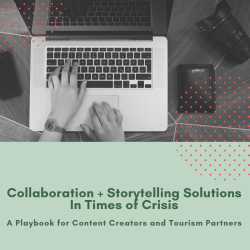While attending a couple of tourism conferences over the past month, one thing I already knew was confirmed: Change in tourism is necessary, but we're all in a different place in accepting and adapting to that reality.
In the recent past, on two distinct occasions, I’ve had conversations with two tourism industry experts aggressively pushing for interruption of the status quo — one specializes in climate science, the other in animal welfare. Despite the urgent need for change in their respective specialties, they both communicated this urgency with the knowledge that every person — and every company — is in a different place of accepting and adapting to the need for change. Some willingly (and even eagerly) embark on this journey. Some are in denial and stuck firmly behind the starting line, more interested in doubling down on “business as usual” rather than putting in the work to build more ethical business models.
What these two ends of the spectrum represent, however, is something noteworthy: There isn't a “right” or “wrong” way to create or define an “ethical” business. There is a spectrum of awareness and action related to sustainability. Change is a journey, and acknowledging the need to change is a first and important step.
And yet, this often clashes with other realities: Conscious consumerism is on the rise, and people increasingly want to support and expect brands to be environmentally and socially responsible. Eager to respond (or, possibly, unsure how to act and respond appropriately), companies often end up greenwashing or deceiving consumers instead of investing in the actual work. “Cancel culture” and shaming amplify this deception. Any actual positive efforts companies have made is overlooked.
Fearful of this backlash, these companies — and others that have witnessed this fallout — adopt a hesitant approach with their sustainability journey: Instead of sharing their experiences of calculating their carbon footprint or cleaning up their supply chain, they stay silent. Instead of celebrating small wins like drawing up a DE l strategy or establishing a partnership that makes it easier to source local materials, they hesitate to share the news.
I understand why companies make these choices. Even those companies considered to be “leaders” in sustainability are criticized — see Patagonia, as a recent example.
Greenhushing (or choosing not to communicate about environmental initiatives and progress) is becoming increasingly common. It's often a far safer and more comfortable choice, especially for those brands that realize they still have a lot of work to do. A single environmental misstep or slow response to a social issue can undercut and overshadow any good work or positive impacts. For small businesses, in particular, this can be devastating.
So, perhaps the question then, isn’t whether a travel-related company or destination is “sustainable” — or even whether it is greenwashing or greenhushing — but how can we, as individuals and as a collective, move in a positive direction on that spectrum together? After all, the tourism industry is better positioned as a partner for meaningful, holistic sustainable change when we’re all lifted up.
Don't let a single "aha" moment pass you by ...
Subscribe to the biweekly Rooted newsletter so you never miss an article.
Use a carrot, not a stick.
Both industry experts I referred to earlier were adamant in the importance of using a carrot and not a stick during this period of massive transition. That is, we need to find ways to helpfully nudge others forward rather than punishing them for not moving at all.
This is a particularly relevant suggestion for those companies actively measuring their scope 3 carbon emissions, which requires knowing how much carbon suppliers or partners emit through their operations. These numbers are entirely beyond a company’s immediate control, and may be difficult to obtain and jarring to comprehend, especially if partners haven’t started decarbonizing on their own accord.
Could these partners be cut off and new ones that are further along on the journey be brought on board? Yes, but the greater opportunity exists when those companies that are further ahead share resources and knowledge to help others make necessary changes.
Call in, don’t call out.
It is so much easier to simply “cancel” companies that make a mistake or don’t say or do the right thing. However, this doesn’t tend to be a productive way to encourage steps in the right direction. Positive reinforcement is much more potent than shaming or blaming.
This is not to say we should accept or excuse intentionally harmful practices or policies. Industries and companies that know better need to actively do and be better. And, we need to hold them accountable for their actions.
But, for those companies that are just starting out on their sustainability journey or moving along that spectrum of action, there are far better strategies for supporting their efforts rather than straight up shutting them down. Productive methods for calling companies in include:
Making suggestions for improvement as a concerned consumer before any fallout occurs.
Contacting them privately with feedback, constructive criticism, and/or support for improvement if a misstep occurs.
Offering to make introductions to other companies or resources that can help correct similar missteps in the future.
We're stronger together than apart.
Celebrate collaboration over competition.

Celebrate small successes with a “yes, and…” mindset.
I was surprised by a recent LinkedIn post I saw that asked whether carbon labels are a form of greenwashing, and the number of responses that questioned their validity. My surprise is due to the fact that I think carbon labels are a fabulous indicator that companies are taking action.
Yes, it’s true that consumers don’t always know what they represent or what to do with this information. Yes, it’s true there is a need for transparency for how these numbers were calculated and what they do and don’t encompass. Yes, it’s true this is not an end-all-be-all solution for demonstrating a commitment to climate action.
And, many of the carbon labels published in the tourism industry are published with an explanation of how they are calculated. And, this is one form of transparency that has been missing from the tourism industry that is now starting to become normalized. And, consumers’ knowledge is growing as well, so we shouldn’t discount their own decision-making skills when it comes to carbon measurements. And, having spoken to many company representatives about publishing carbon labels, this is actually a potent internal motivator to continue cutting carbon versus calling it a one-and-done activity.
It’s okay that there are imperfect solutions even if there is more work to be done. Becoming a more sustainable company is always a work in progress. Celebrating and normalizing positive steps along this journey is an incentive to keep moving in the right direction.
Don’t assume everyone knows what you know.
It is a privilege to have knowledge and access to resources that allow travel companies to make operational adjustments and implement policies that are better for people, places, and the planet. Some people and companies are further behind on the sustainability journey simply because they don’t know: They don’t know what to do, how to do it, or even that they should be doing it.
Don’t assume that inaction is due to a lack of caring. In some cases, it may be and the stick may be a more prudent option than the carrot. But, often, it’s not a lack of interest or will but a lack of knowledge and resources that holds companies back. Don’t under-estimate what people and companies are interested in pursuing, want to know, or be capable of doing if given the right support.
Continue to zig, even if it’s easier to zag.
The traditional tourism model under which we’ve been operating is broken, and change is desperately needed. Without this much-needed change, the future of tourism is in peril. Reimagining and retooling the way we operate requires effort. Those companies stubborn and stuck with antiquated practices may be left behind.
Challenging the status quo will be met with resistance because change is inherently hard.
Do it anyway.



